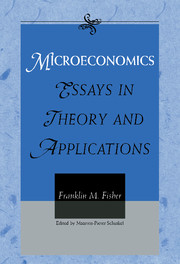Book contents
- Frontmatter
- Contents
- Introduction
- Part I Disequilibrium and Stability
- 1 The Formation of Economic Magnitudes: Disequilibrium and Stability (1990)
- 2 Quasi-Competitive Price Adjustment by Individual Firms: A Preliminary Paper (1970)
- 3 Stability and Competitive Equilibrium in Two Models of Search and Individual Price Adjustment (1973)
- 4 On Price Adjustment without an Auctioneer (1972)
- 5 Quantity Constraints, Spillovers, and the Hahn Process (1978)
- 6 On Stability Analysis with Disequilibrium Awareness (1988)
- 7 It Takes t* to Tango: Trading Coalitions with Fixed Prices (1989)
- 8 An Alternate Proof and Extension of Solow's Theorem on Nonnegative Square Matrices (1962)
- 9 Choice of Units, Column Sums, and Stability in Linear Dynamic Systems with Nonnegative Square Matrices (1965)
- 10 A Simple Proof of the Fisher–Fuller Theorem (1972)
- 11 Gross Substitutes and the Utility Function (1972)
- Part II Welfare Economics and Consumer Theory
- Part III Applications of Microeconomic Theory
- Part IV Industrial Organization, Economics, and the Law
- Part V Public Policy Applications
- Epilogue
- Indexes
4 - On Price Adjustment without an Auctioneer (1972)
Published online by Cambridge University Press: 20 March 2010
- Frontmatter
- Contents
- Introduction
- Part I Disequilibrium and Stability
- 1 The Formation of Economic Magnitudes: Disequilibrium and Stability (1990)
- 2 Quasi-Competitive Price Adjustment by Individual Firms: A Preliminary Paper (1970)
- 3 Stability and Competitive Equilibrium in Two Models of Search and Individual Price Adjustment (1973)
- 4 On Price Adjustment without an Auctioneer (1972)
- 5 Quantity Constraints, Spillovers, and the Hahn Process (1978)
- 6 On Stability Analysis with Disequilibrium Awareness (1988)
- 7 It Takes t* to Tango: Trading Coalitions with Fixed Prices (1989)
- 8 An Alternate Proof and Extension of Solow's Theorem on Nonnegative Square Matrices (1962)
- 9 Choice of Units, Column Sums, and Stability in Linear Dynamic Systems with Nonnegative Square Matrices (1965)
- 10 A Simple Proof of the Fisher–Fuller Theorem (1972)
- 11 Gross Substitutes and the Utility Function (1972)
- Part II Welfare Economics and Consumer Theory
- Part III Applications of Microeconomic Theory
- Part IV Industrial Organization, Economics, and the Law
- Part V Public Policy Applications
- Epilogue
- Indexes
Summary
Introduction
As is well known, a major defect with existing models of competitive disequilibrium is the assumption that prices move as monotonic functions of excess demands as though adjusted by a fictitious auctioneer. Such a model of price adjustment, common to both tâtonnement and non-tâtonnement processes, describes nobody's actual behaviour in most markets. Yet it is clearly a relatively easy way out of the dilemma of deciding how prices move when every firm takes them as given.
In my earlier paper (Fisher, 1970), I considered a highly simplified model of a single market in which firms quoted individual prices and consumers searched for low quotations, with search not being costless. In that model, firms were assumed to believe themselves in competition, in the sense that the demand curves that they faced were flat or almost flat at a true (but unknown) market price that they attempted to charge. Individual prices were adjusted by the individual firms as functions of the excess demands that they themselves encountered. I was able to show that under rather general restrictions on the search procedures used by consumers, the market always converged to the competitive partial equilibrium.
The present paper extends that analysis (with some alterations) to the case of general equilibrium in an exchange economy. A stability theorem is proved with prices still under the control of real rather than invisible participants. Interest centres not on the details of proof (indeed, I have borrowed much of the apparatus from Arrow and Hahn) but on the construction of a model without an auctioneer.
- Type
- Chapter
- Information
- MicroeconomicsEssays in Theory and Applications, pp. 87 - 109Publisher: Cambridge University PressPrint publication year: 1999



